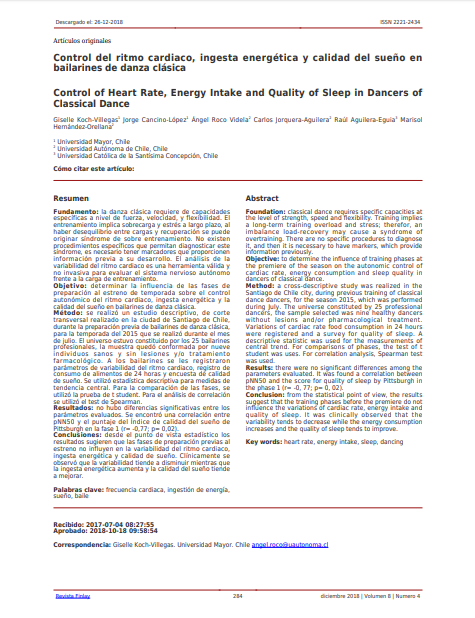Control of Heart Rate, Energy Intake and Quality of Sleep in Dancers of Classical Dance

Fecha
2018Autor
Koch-Villegas, Giselle [Univ Mayor, Santiago, Chile]
Cancino-López, Jorge [Univ Mayor, Santiago, Chile]
Roco Videla, Angel
Jorquera-Aguilera, Carlos
Aguilera-Eguia, Raúl
Hernández-Orellana, Marisol
Ubicación geográfica
Notas
HERRAMIENTAS
Acceda a títulos restringidos
¿Cómo descargar?Resumen
Foundation: classical dance requires specific capacities at the level of strength, speed and flexibility. Training implies a long-term training overload and stress; therefor, an imbalance load-recovery may cause a syndrome of overtraining. There are no specific procedures to diagnose it, and then it is necessary to have markers, which provide information previously. Objective: to determine the influence of training phases at the premiere of the season on the autonomic control of cardiac rate, energy consumption and sleep quality in dancers of classical dance. Method: a cross-descriptive study was realized in the Santiago de Chile city, during previous training of classical dance dancers, for the season 2015, which was performed during July. The universe constituted by 25 professional dancers, the sample selected was nine healthy dancers without lesions and/ or pharmacological treatment. Variations of cardiac rate food consumption in 24 hours were registered and a survey for quality of sleep. A descriptive statistic was used for the measurements of central trend. For comparisons of phases, the test of t student was uses. For correlation analysis, Spearman test was used. Results: there were no significant differences among the parameters evaluated. It was found a correlation between pNN50 and the score for quality of sleep by Pittsburgh in the phase 1 (r= -0, 77; p= 0, 02). Conclusion: from the statistical point of view, the results suggest that the training phases before the premiere do not influence the variations of cardiac rate, energy intake and quality of sleep. It was clinically observed that the variability tends to decrease while the energy consumption increases and the quality of sleep tends to improve.
URI
https://www.medigraphic.com/pdfs/finlay/fi-2018/fi184f.pdfhttp://repositorio.umayor.cl/xmlui/handle/sibum/6258
Coleccion/es a la/s que pertenece:
Si usted es autor(a) de este documento y NO desea que su publicación tenga acceso público en este repositorio, por favor complete el formulario aquí.